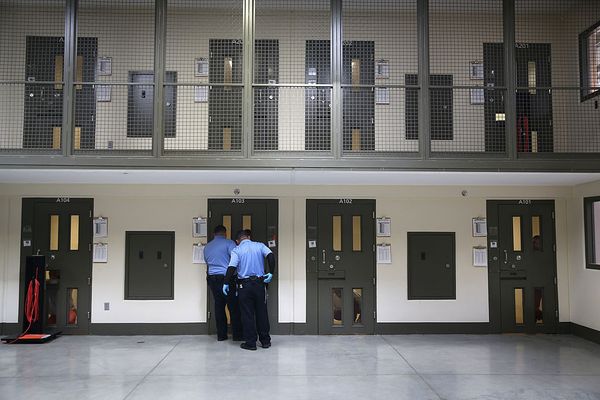
In its elegant simplicity, its formal daring and superbly subtle and controlled performances, Tina Satter’s movie is surely one of the best at the Berlin film festival: an eerily gripping true-life drama concerning people who look like elaborately reanimated, hyperreal ghosts from the past.
This is an exercise in verbatim cinema inspired by the case of Reality Winner, a 26-year-old US intelligence officer and translator who in 2017 was arrested for leaking to the media a secret government document concerning apparent Russian interference in the 2016 presidential election. Her first name was an idea from her dad who had been inspired by a T-shirt reading “I coached a real winner” and wanted something aspirational. And her name is here endowed with an ironic new meaning.
The transcript of an audio recording of the FBI officers’ arrest and questioning of Winner became public; now Satter has used it, to the letter, as the basis of a movie (adapted from her original stageplay Is This a Room). It shows us the moment-by-moment situation as Winner, superbly played by Sydney Sweeney, is politely confronted outside her house by the two federal agents, Garrick (Josh Hamilton) and Taylor (Marchánt Davis). They have a warrant to search her house and car and, with a weirdly matey pass-agg insistence, repeatedly invite Winner to submit to their questioning on a “voluntary” basis, though without reading Winner her rights or mentioning anything about her needing a lawyer. This portrayal of their needling, overbearing ersatz friendliness is similar to the Monica Lewinsky interrogation scenes in the recent true-crime TV drama Impeachment: American Crime Story starring Beanie Feldstein.
But in other ways it is, of course, completely different from that, or any other conventionally fictionalised and scripted drama. Reality’s cool, unemphasised and unsignposted dialogue goes completely against what we expect from a movie’s usual direction and editing: hitting significant dramatic beats, making important things obvious and (to quote the remark sometimes attributed to Billy Wilder) making the subtleties obvious as well.
This, by contrast, is the live feed from reality, what the raw and untreated dialogue we speak sounds like when all laid out. When Winner voices concerns about her cat and dog, that might, in a conventional drama, be the cue for gentle comedy. Not here. It just is. And when Winner is revealed to have an extensive collection of guns, a normal drama might feel the need to explain a liberal whistleblower-hero having such a Maga enthusiasm, or even cut it out of the drama. Again: not here.
However, Satter does occasionally undercut her rhetoric of reality: when the transcript is unclear or redacted, Winner’s image will flicker or briefly vanish – another uncanny touch. Meanwhile the behaviour of the officers themselves is thrillingly deadpan: Garrick takes the lead with questioning – is he going to turn nasty any moment, or be revealed as the “good cop” to his partner’s tougher persona? That’s not this film’s style.
Sweeney’s performance has a superb micro-calibration as she plays it calm and noncommittal, not wanting to concede that she knows exactly why they’re there, and the two officers match this by playing dumb themselves – at least at first – and not revealing their hand. Is Winner a very cool customer, or in very deep shock? This, the film says, is what it really feels like to be on the receiving end of the law in a case like this: a calm, professional, technocratic but relentless display of overwhelming power.
But the film also asks us: is this, in fact, reality? Or is it not rather another form of fictional imposture? Is the room-temperature style of verbatim cinema an artefact that might not fully acknowledge the growing terror? Either way, it is a brilliant piece of work.
• Reality screened at the Berlin film festival.







